Contribute to medical breakthroughs while receiving potential benefits in solid tumor clinical trials in Nebraska.
Solid Tumor Clinical Trials in Nebraska
What is Solid Tumor?
A solid tumor is a mass of abnormal cells that grow together in the body, forming a lump. These tumors can be either cancerous or non-cancerous. Types of solid tumors include Triple Negative Breast Cancer, Pancreatic Cancer, Head and Neck Cancer, Cervical Cancer, Endometrial Cancer, Ovarian Cancer, Prostate Cancer, and Non-Small Cell Lung Cancer.
Take Control of Your Health: Learn About Solid Tumor
Advancing Research and Solid Tumors Potential Treatment
Solid tumors are identified as abnormal mass that does not usually contain cysts or liquid areas. Solid tumors account for approximately 90 percent of adult cancers. It can be either benign or malignant and are classified based on the type of cells from which they originate. Examples include sarcomas, carcinomas, and lymphomas. Unlike solid tumors, leukemias (blood cancers) typically do not form solid masses.
Survival rates for advanced solid tumors vary widely, with factors like the type of metastases and treatment response playing critical roles. Early detection is crucial, as localized tumors have significantly higher survival rates. Research and clinical trials are essential in developing innovative treatments to improve outcomes for patients suffering from solid tumors.
NHO Revive understands the challenges posed by advanced solid tumors and is actively conducting research studies to explore solid tumors potential treatment. Our goal is to provide exceptional care and unwavering support throughout your journey in our clinical trials.
You might be eligible for Solid Tumor Clinical Trials
- Age: 18 Years and older
- Gender: Male and Female
- Confirmed diagnosis of advanced or metastatic solid tumor.
- Total Studies: 01
*Participation in our clinical study is voluntary, and it’s important to consult with your healthcare provider before making any decisions related to your treatment or care.
*Participation in the clinical trials causes no expenses for you or your private medical insurance. You’ll receive compensation for your time and travel.
Learn and Understand About Solid Tumors
A diagnosis of advanced solid tumor can be a challenging and life-altering experience. However, it’s important to remember that you’re not alone. Significant advancements are being made in cancer research, and solid tumor clinical trials in Nebraska offer access to promising new treatment options.
At NHO Revive, we are deeply committed to improving patient outcome. Our team is actively engaged in studying solid tumors investigational drug’s safety and efficacy to test its anti-tumor properties. Our research aims to create new opportunities for patients, offering them a fighting chance against this formidable disease. We understand the gravity of an advanced solid tumor diagnosis and are here to provide support, care, and innovative treatment options every step of the way.
What to Expect
If you volunteer for NHO Revive Solid Tumor Clinical Trials by completing the form above, our study team will reach out to assess your eligibility. They’ll review the study specifics with you to check if you meet the criteria for participation.
If you qualify, you’ll be invited to the study site for screening, located within a 50-mile radius of where you are now. The doctors will discuss the trial’s duration and its impact on your cancer treatment. Once everything is explained, participants will be asked to sign an informed consent form. Make sure to go through everything with your provider. We value transparency between our participants and investigators.
*You’ll receive study-related care at no cost, including comprehensive physical exams and evaluations conducted by skilled physicians.
Age
18 Year and Older
Gender
Male and Female
Location
Nebraska

300
Recognizing the Signs of Advanced Solid Tumor
Recognizing advanced solid tumors typically involves observing specific symptoms and undergoing medical evaluations. Common signs include persistent pain, unexplained weight loss, fatigue, and noticeable lumps or masses. Additionally, symptoms may vary depending on the tumor’s location, such as difficulty breathing for lung tumors or abdominal discomfort for gastrointestinal tumors. If you experience these symptoms, it is crucial to consult a healthcare provider. Recognizing the signs is crucial is getting urgent care and enroll is possible solid tumor clinical trials in Nebraska.
Frequently Asked Questions
Interested in learning more about our research? Explore our frequently asked questions to gain knowledge about this condition.
What causes solid tumors to form?
Solid tumors can form due to a variety of factors, including genetic mutations, environmental exposures (such as radiation or carcinogenic chemicals), lifestyle factors (such as smoking or poor diet), and underlying health conditions. Sometimes, the exact cause is unknown.
Are all solid tumors cancerous?
No, not all solid tumors are cancerous. Solid tumors can be benign (non-cancerous) or malignant (cancerous). Benign tumors do not spread to other parts of the body, whereas malignant tumors can invade nearby tissues and metastasize to distant organs.
What should I expect during a solid tumor clinical trial?
During a clinical trial for oncology studies, participants undergo various procedures, including physical exams, lab tests, and imaging studies. They may receive investigational treatment or a placebo and will be closely monitored for side effects and treatment effectiveness. All this will be discussed with you before you sign the informed consent form.
Are there any risks involved in participating in a clinical trial?
Yes, there are risks involved, which can include side effects from the investigational treatment. Before participating, these risks are explained in detail during the informed consent process.





